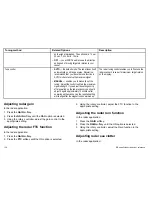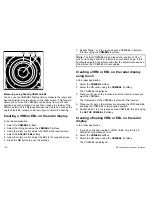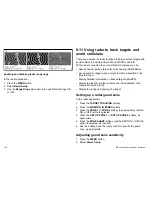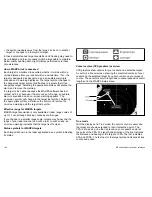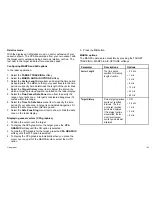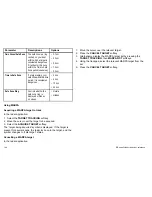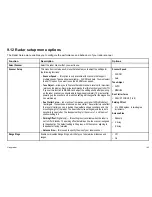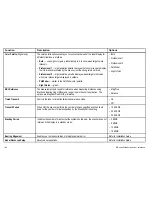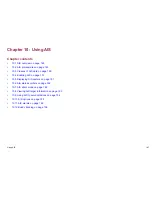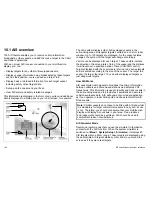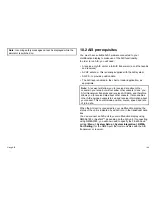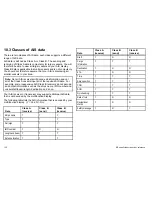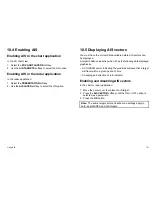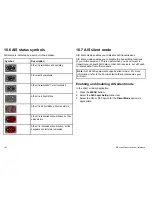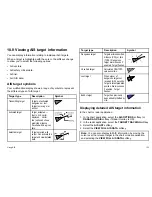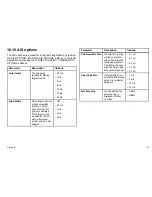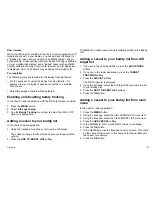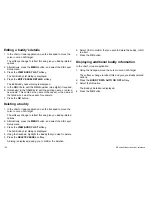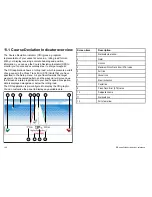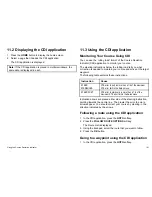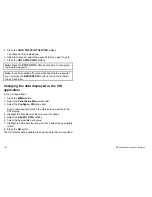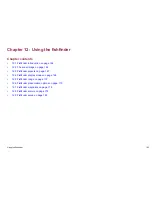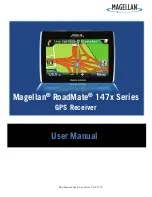
10.1 AIS overview
The AIS feature enables you to receive certain information
broadcast by other vessels, and add them as a target in the Chart
and Radar applications.
With an optonal AIS receiver connected to your multifunction
display, you can:
• Display targets for any other AIS-equipped vessels.
• Display voyage information being broadcasted by these targets,
such as their position, course, speed and rate of turn.
• Display basic or detailed information for each target vessel,
including safety critical target data.
• Set up a safe zone around your boat.
• View AIS alarm and safety related messages.
This information is displayed in the form of an overlay and additional
data is displayed in a dialog box on your chart screen, for example:
D9056_1
0
9 7 ° T
1 1. 6 k t
1. 2 3 7 n m
0 0 h 0 4 m3 3 s
Safety
critical data
Heading
Large
vessel
Direction
of turn
Small
vessel
COG/SOG
vector
Safe zone (defined by
distance or time)
Dangerous
target (flashes)
Sleeping
target
The AIS system displays other AIS equipped vessels in the
surrounding area as triangular targets overlaid on a chart or radar
window. Up to 100 targets are displayed. As the vessel’s status
changes, the symbol for the target will change accordingly.
Vectors can be displayed for each target. These vectors indicate
the direction of travel and rate of turn of the vessel and the distance
it will travel over a specified period of time (COG/SOG vector).
Targets displayed with their vectors are referred to as ‘active targets’
and are scaled according to the size of the vessel. The larger the
vessel, the larger the target. You can either display all targets or
just dangerous targets.
How AIS Works
AIS uses digital radio signals to broadcast ‘real-time’ information
between vessels and shore based stations via dedicated VHF
frequencies. This information is used to identify and track vessels in
the surrounding area and to provide fast, automatic and accurate
collision avoidance data. AIS will augment your radar application,
as it can operate in radar blind spots and can detect smaller AIS
fitted vessels.
Note:
Smaller vessels do not have to be fitted with AIS and whilst
it is mandatory for larger commercial vessels to carry AIS, its use
is not. Therefore, you should not assume that your multifunction
display will display ALL vessels in your area. Due prudence
and judgement should be exercised. AIS should be used to
complement radar, not substitute it.
AIS Simulator Mode
Raymarine recommends that you use the simulator to familiarize
yourself with the AIS function. When the system simulator is
switched on (
Menu > System Setup > Simulator
), it displays 20
AIS targets within a 25nm range. These targets are displayed using
the appropriate AIS targets status symbol, and move around the
screen as if they were real targets.
148
E-Series Widescreen User reference
Summary of Contents for E90W
Page 2: ......
Page 4: ......
Page 16: ...16 E Series Widescreen User reference...
Page 40: ...40 E Series Widescreen User reference...
Page 46: ...46 E Series Widescreen User reference...
Page 68: ...68 E Series Widescreen User reference...
Page 100: ...100 E Series Widescreen User reference...
Page 200: ...200 E Series Widescreen User reference...
Page 210: ...210 E Series Widescreen User reference...
Page 220: ...220 E Series Widescreen User reference...
Page 224: ...224 E Series Widescreen User reference...
Page 228: ...228 E Series Widescreen User reference...
Page 244: ...244 E Series Widescreen User reference...
Page 248: ...248 E Series Widescreen User reference...
Page 249: ......
Page 250: ...www raymarine com...

